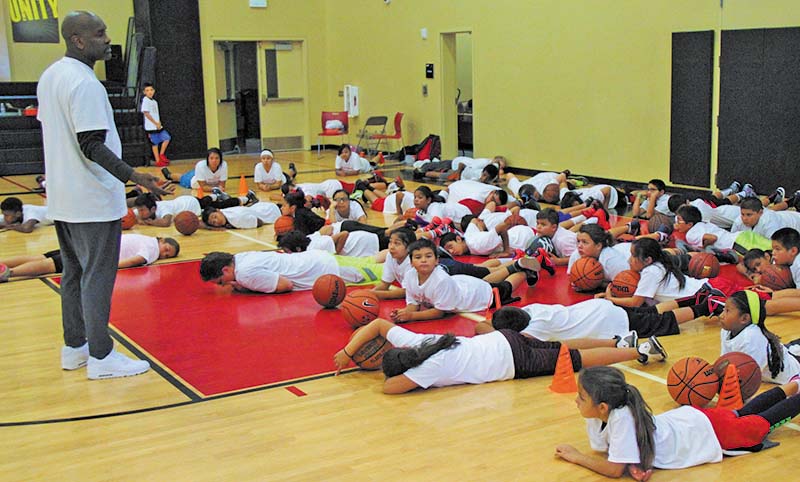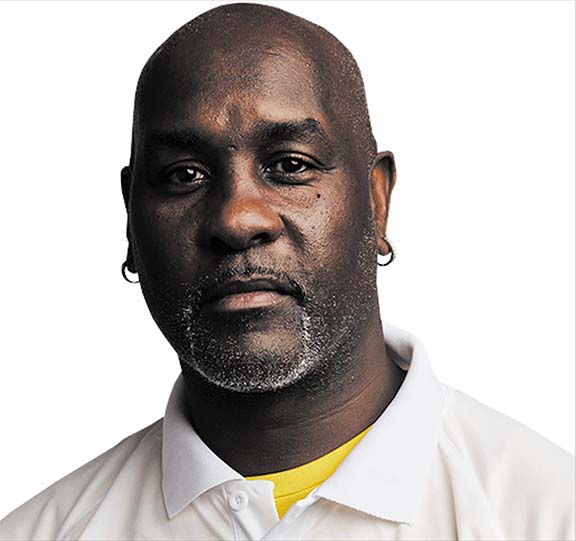
By Micheal Rios, Tulalip News
Seattle SuperSonics legend Gary Payton, better known by his nickname “The Glove”, partnered with the Native basketball camp Rise Above in order to put his Hall of Fame talents to good use – impacting thousands of Native youth through basketball. His partnership with Rise Above took him to Colville, Kalispel, Coeur d’Alene and many other reservations throughout the Pacific Northwest.
One of the truly unforgettable basketball camps Rise Above held was in Tulalip. Back in September 2015, Payton co-hosted a youth skills camp at the Tulalip Youth Center. For all those youth who participated and the adults who volunteered, they quickly realized the camp was about much more than just basketball. It was about using basketball as a means to empower our kids and teach life lessons, while instilling a bit of resiliency in each participant so they could grow into productive members of the community.
Following that memorable basketball camp, Payton sat down with Tulalip News staff to share what his insights are on how to most effectively impact urban youth.
You may be wondering what kind of insight a former NBA superstar can have about our Native kids. Well, the answer is simple – Payton’s very familiar with growing up in an impoverish neighborhood, being surrounded by the poverty mindset, witnessing drug use and petty crime being committed by his friends and family…all while having to struggle against a system determined to see him fail.
Payton grew up and survived the drug-infested streets and gang filled neighborhoods of Oakland, California in the 1980s. Oakland was plagued in the eighties by a continuation of the rising crime rate and drug issues of the previous decade. Crack cocaine exploded as a big problem for the city during this period, and Oakland was regularly listed as one of the U.S. cities most plagued by crime.
From being born and raised in Oakland to currently following his new life mission to travel to mentor and coach youth in most need of positive role models, Payton has the ability to not just address the issues of most concern to today’s youth, but also offer simple guidance to the adults who want to make our community better.

Photo courtesy of BIG3 basketball.
The following conversation may have happened six years ago, however the knowledge and perspective the Seattle hoops icon offered is just as relevant today. Here now, we offer our See-Yaht-Sub readers unique insight from one of the best point guards in NBA history as he endeavors to assist parents, teachers, and guardians to create a better environment for our kids.
“Growing up in Oakland, California I was in a similar environment to a lot of these kids today, where they have a lot of free time on their own with not much adult supervision. That means you get to be around your friends the majority of the time, and your friends are going to be doing things that you want to be involved in because you want to fit in. Then things start to happen.
As a kid, I had a father who was working all the time, but he used to tell me ‘you got to be your own man, you got to be a leader not a follower.’ If somebody says something or wants to do something that ain’t right, then tell them they ain’t right. If they don’t want to be that person who helps you and says okay I understand, then they aren’t really not your friend. That’s what a lot of these kids are starting to see more and more of because youth of this generation prefer to do anything to not be bored.
My generation was different because we knew how to go outside and just have fun. Everyone didn’t have a fancy cellphone, iPads, and all the rest of it. Even our cartoons and TV shows were only on during Saturday mornings and a couple hours after we got home from school. Today TV, cellphone apps, and the internet caters to these kids so they can be burying their face in a screen all day, every day.
I think for these kids today, all they need is a little push. They need someone, like myself, who has been through and seen the same things they have, to come around and give them a talking to and tell them the right way and what not to do. Because once we leave and they get someone they think is a friend who pressures them, it’s hard for them to make the right decision because of the peer pressure and idea it’s better to fit in than stand out.
But when these kids have adults and role models around who are not only looking out for their best interest, but are actually making themselves available by text, phone call, or to meet up to talk, then it becomes easier for them to say no to the bad choices and yes to the good ones. All they need is to have that support behind them, people they know are helping build them up into the best person they can be. But it can’t be only a sometimes thing, it has be an all the time thing because these kids can tell who is fake and who is real.
It’s important for us as mentors, the adults who these kids will listen to and respect, to get the youth to set individual goals. We want them to set goals or to have an ultimate goal for themselves. Most of these kids don’t have goals other than to have fun or good times with their friends, that’s not a goal. We see it all the time where they’ll get just a little bit of satisfaction from what they are doing in school or from actual hard work and then they’ll immediately flip to okay that’s enough now let me go and hangout with my friends. That mindset comes from not having goals to succeed, not having the goal to be someone who the community looks up to.
If they had goals that are bigger than just hanging out with friends or messing around on social media, then they’d be more willing to say no to the little things that get in their way in order to achieve their goals. That’s the biggest problem with youth today. Their so focused on the immediate and what’s right in front of them that they don’t see the larger picture, they don’t have the passion to set long-term goals and follow through. They don’t understand that by focusing in and setting goals today that they are actually investing in their future.
As mentors, advocates, and educators we have to remain vigilant and get these kids to buy into setting goals and following through. It starts with their education because nothing is more important than getting a good education. A good education means opportunity and with opportunity comes the ability to do what you want to do, not just what you have to in order to scrape by. We know that kids today love doing what they want to do, so now it’s on us to get them to see that through education they can be adults doing what they want to do as well. Getting them to set goals in the classroom and with school is where it starts.
We want them to have goals like, ‘I’m going to get better grades this year than I had last year’, ‘I’m going to make honor roll this semester’, ‘I’m going to graduate with my high school diploma’, and ‘I’m going to go to college’. They seem like no-brainers, but we’ve seen they are too interested in other things and have lost that focus in school and on their education, and I’m going to keep going back to it and say it’s because there’s a lack of goal setting. It’s not good enough to be satisfied with just showing up or only doing enough to get by. We have to want and expect more from them in order to get them to want and expect more from themselves.
Our mission as mentors is to encourage, and support our youth as they discover who they are and what they want to be. Through goal setting and an emphasis on education as future opportunity for themselves, they’ll be able to become the best person they can be. Once they have that mindset to want better, to be better, everything will start to click and it’s an amazing process to witness. These kids have so much they can accomplish and so many opportunities available to them. When they are empowered to realize they’re capable of reaching their goals and achieving like they never thought before, then this entire community benefits. Let’s do our part to make this happen.”